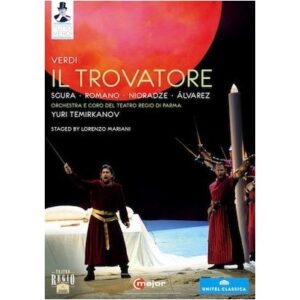Rumor has it that the audiences in Parma used to be the strictest and least forgiving in the world; booing singers off the stage who transgressed was par for the course. They have softened considerably if this 2010 performance of Il trovatore is any way to judge.
The physical production could not be duller: William Orlandi’s playing field and costumes are barren, dark gray, and almost devoid of props. A large plastic or wooden horse shows up for Leonora’s entrance; there seems to be, in addition to a pile of rocks, some booty in the Gypsy Camp (and everyone is wearing red); a bed surrounded by candles appears in the second scene of Act 3; an outline of a castle pops up now and then; a big, round moon changes color; there are helmets and swords galore.
Lorenzo Mariani is credited as Stage Director—traffic cop would be a better phrase. The cast stands and delivers—and lurches, in the case of the soprano—and tries not to bump into one-another. When and where are we? Costumes are vaguely 15th century, although Ines seems to be wearing an aluminum foil outfit with a pointy hat. Di Luna and Manrico dress alike—is this subtlety?
Soprano Teresa Romano sings Leonora. It is a voice of some size and appeal, with a nice, well-focused mid-range and big if sometimes ghastly and invariably lunged-at high notes. And she fudges cadenzas, hurling her voice here and there and landing near a good note, all at the same volume and with what passes for temperament. Mzia Nioradze’s Azucena will do in a pinch—it is short at both ends, but she emotes up a storm. Marcelo Alvarez is his usual reliable self, singing with less subtlety than he can, but stirring up real excitement—and, in this company, star power—as Manrico. Claudio Sgura’s rich baritone is vocally a true find as the Count di Luna; with a director and some notion as to what the character is all about he could cause true excitement. As it is, he does some fine singing. Deyan Vatchkov’s flexible bass is most welcome as Ferrando. The Ines sings so sharp in her opening scene with Leonora that it is laughable.
The audience applauds politely throughout for most of the singers (remaining silent after Romano’s awful rendition of her fourth-act aria), save for the baritone, whom they genuinely appear to like. Yuri Temirkanov, normally an imaginative, energetic leader, seems happy not to have to duck tomatoes thrown from the no-longer fussy and expert audience. Forget this: a good DVD Trovatore is to be found on Arthaus starring Raina Kabaivanska, Placido Domingo, Fiorenza Cossotto, and Piero Cappuccilli. It’s a bit old in sound and feel—1978—but it’s the real thing. And for a truly hair-raising, if black-and-white, decrepit-looking, and lip-synched version, go to Gencer and Del Monaco from an Italian film circa 1957 (Hardy).
































